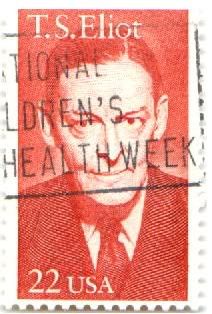backyard crowing

-----------------------------------------------------------------------------------------
t. s. eliot, finally i get to meet you
According to my american literature book:
"In the period between the two world wars, poetry and criticism were largely dominated by a single figure, T.S. Eliot. Even more than Ezra Pound, he shaped the tastes and the critical vocabulary of a generation. The Wasteland, the most startling and innovative of Eliot's poems, had the effect, as William Carlos Williams remarked, of "an atom bomb"; and in the decades that followed, Eliot became the major poet writing in English and the authoritative voice of modern criticism--esteemed, imitated, and quoted on both sides of the Atlantic.
Eliot was a descendant of a prominent New England family dating from the seventeenth century. He was born in St. Louis, Missouri. In his youth he attended a Boston prep school and then entered Harvard, where he studied literature and philoposhy. He served as editor of the Harvard Advocate, and he developed, from reading the poetry of the French symoblists, his early poetic style. From Harvard, Eliot went to Europe to complete a doctoral dissertation on F.H. Bradley, an English philosopher from whom Eliot derived one of his pervasive themes, the "isolated consciousness."
When World War I began, Eliot settled in London, where he worked as a bank clerk. In 1917, in the wake of a fateful meeting with Ezra Pound, Eliot published his first book of poems, Prufrock and Other Observations. He became an editor of the Egoist and then founding editor of the Criterion, for which he wrote some of his early reviews and criticism. Then in 1922, The Waste Land (dedicated to its editor, Pound) became the poem that set the tone of the postwar era. Emphasizing the decay of Western culture, Eliot's poem was heralded as the major document of modern despair. Its ranging meters and fragmented style--an interweaving of reminiscences, vignettes, literary allusions, anthropological love--became models of modernist techniques.
Loosely patterned on medieval Grail legend, The Waste Land reflects the theme and direction of Eliot's own life: the quest for salvation. In the years that followed, Eliot's writing expressed a deepening conservatism in religion and politics. In 1927 he startled many admirers by announcing his adoption of British citizenship and his conversion to the Church of England. The change was paralleled by the movement of his poetry from the secular to the ascetic--from the pessimism of "Gerontion" (1919), to the religious faith of "Ash Wednesday" (1930), the "coversion" poem drawn from the Anglican service and the disciplines of Christian asceticism. Eliot's poetry culminated in the religious meditations of Four Quartets (1936-1943), in which the theme of spiritual quest becomes both personal and universal, presenting man's effort to transcend the force of time and to achieve the "still moment" of the eternal.
In his later years Eliot devoted himself mainly to verse drama, a genre he had long wanted to restore to the modern stage. His first play, based upon the martyrdom of Saint Thomas Becket, Murder in the Cathedral (1935), met with some success. The later plays, in contemporary settings, include The Family Reunion (1939), The Man (1958). Although Eliot's plays are often impressive in their poetry, in general, heir sophisticated moral and religious arguments have kept them from achieving wide popular appreciation.
The antiromantic tendency of Eliot's literary criticism was evident with his first book of essays, The Sacred Wood (1920). His focus on the English writers of the sixteenth and seventeenth centuries led to a general reassessment of poetic tradition. Most notable was his "discovery" of the Metaphysical poets, in an essay that made John Denver and his followers a contemporary vogue. In 1948 Eliot's achievements were recognized by the awards of the British Order of Merit and the Nobel Prize for Literature. In the years that followed, Eliot's reputation declined, yet he continued to the end to exercise authority in the world of letters, just as his masterpiece, The Waste Land, has remained one of the most influential poems of the twentieth century."
 -------------------------------------------------------------------------------
8:39 pm
-------------------------------------------------------------------------------
8:39 pm
"and if you want it
come and get it
for crying out loud
the love that I was
giving you was
never in doubt
let go your heart
let go your head
and feel it now
babylon"
this is a song in the background of the trailer for "serendipity", a john cusack/kate beckinsale movie. yes, it was cheesy, but that song!
i finally found it. these are the most touching lyrics, i've never really listened to them before. the singer is david gray, and i love him! wow. what a song.
3:33 p.m. - 2005-11-14
-----------------------------------------------------------------------------------------
|
|